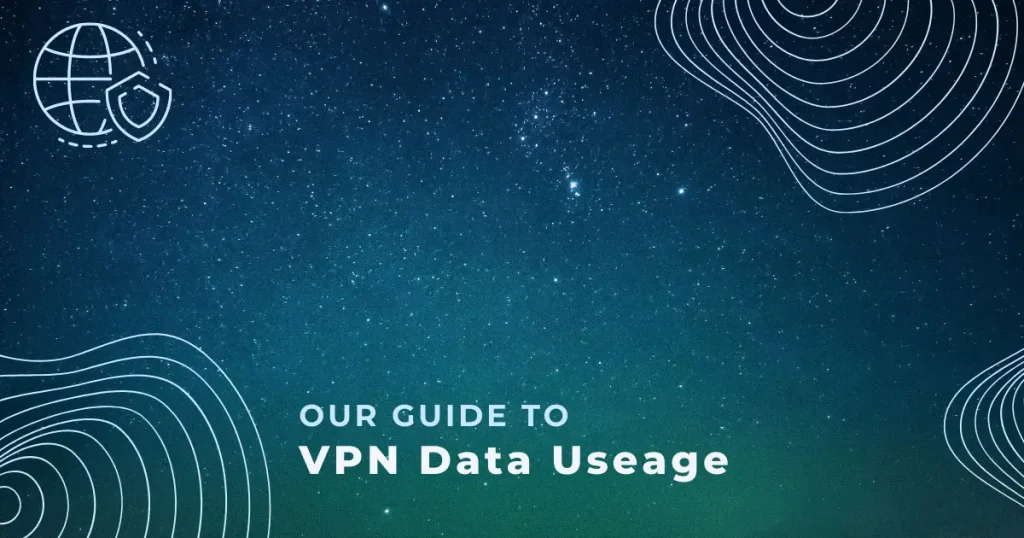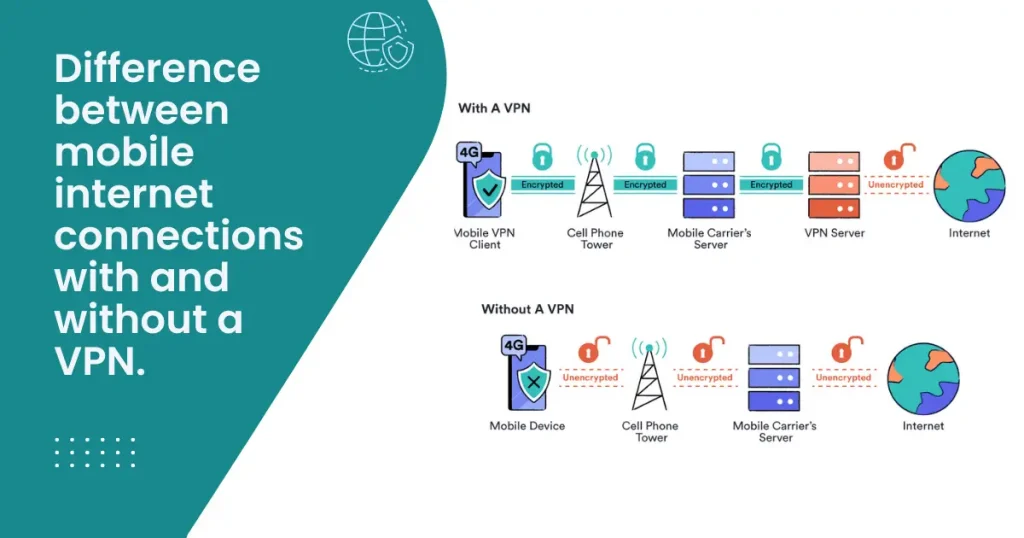
Chris Lawrence is a journalist and chief editor at Wlan Labs. He has been writing about technology for more than ten years. He writes about everything ranging from privacy to open source software. His goal is to educate readers about important topics to help make their lives easier.
A VPN, or Virtual Private Network, is a type of technology that allows users to create a secure connection over a public network. By using encryption and other security measures, VPNs allow users to send and receive data privately, without the risk of interception by third parties.
Businesses often use VPNs to protect sensitive data, but individuals can also use them to improve privacy and security online. It is crucial to consider speed, security, and compatibility factors when choosing a VPN. The best VPNs will offer a balance of all three.
Unfortunately, even if you’re using a VPN, you’re still using data. Connecting to a VPN server while using cellular data is still included in your monthly data allotment. It’s impossible to avoid it. Due to ‘encryption overheads,’ utilizing a VPN increases your data consumption.
How Does It Work?
We need to look at how a VPN works to understand why VPNs utilize data and how much data does a VPN use.
When you start using a VPN app on a mobile device, your phone connects to a VPN server instead of the website you want to visit. It then makes a secure connection to that website on your behalf and delivers any data you request.
This has two key advantages:
- Because the VPN server obscures your IP address, no one can find out who you are online.
- Alternatively, the server may be situated in a separate nation. That means you may access material that is generally only accessible in that country, such as US Netflix, if you’re not in the United States.
A VPN encrypts all of your data to keep your cell provider from knowing what you’re doing on the internet. VPN servers are visible to your mobile service provider, but not what you’ve asked them to do or where your traffic will go.
Do VPNs Need An Internet Connection To Work?
A functioning internet connection is still required for a VPN to function. To get to the VPN server, your traffic still needs to go via the network infrastructure of your mobile phone operator.
Mobile carriers may still monitor how much data you’re using and bill you appropriately, even if they can’t see the contents of the information that travels between your phone and the VPN server.
Because of the ‘encryption overhead‘, using a VPN consumes more bandwidth than not using a VPN. This is something we’ll go into in more detail later on.
Consider using a virtual private network (VPN) to get around your monthly data cap.

Do VPNs Increase Data Usage?
Yes, utilizing a VPN consumes more mobile data than without one.
According to our VPN data testing, using a VPN might raise your data use from 4% to 20%.
A variety of variables, including the kind of VPN protocol you’re using, might increase data usage. This is referred to as the ‘overhead’ of the VPN or encryption.
There’s a lot of overhead that accumulates over time. Streaming a two-hour Netflix movie in HD without a VPN consumes around 6GB of bandwidth. This might climb to as much as 7.2GB when using a VPN.
Using a VPN can cause your monthly data allocation to be used faster if you have a data cap on your mobile device. Travelers may have to pay extra for data roaming due to this change.
Note: For a more accurate estimate of the amount of data a VPN will use, multiply your current data consumption by 1.04 (for a 4 percent overhead) or 1.2. (for a 20 percent overhead).
Why Does Vpn Increase Data?
Using a virtual private network (VPN) causes an increase in mobile data consumption because of the way information is carried over the internet.
Data is broken into ‘packets’ sent and received over the internet. A maximum quantity of data may be sent in a single packet (usually 1,500 bytes or 1,500 plaintext characters).
Packets are more than simply a container for the data you’re sending or receiving. Information about the payload, including its origin, destination, and IP version, must also be included in this buffer.
At least 20 bytes of space must be allocated to this information in the IP header. Your payload data will have a reduction of 20 bytes as a result.
With a VPN, your data is encapsulated in an additional packet (with specific headers) and sent to the VPN server. This means that the amount of space available for your payload data is reduced even more.
Because of this, a file that would have fit perfectly into one packet may have to be divided into two packets when a VPN is utilized. As a result, mobile data use rises by 4-20 percent compared to when not employing a VPN.
How much data does VPN use per hour?
VPNs are a great way to keep your data secure and protected while online. However, many people don’t realize how much data they use while connected to a VPN.
Depending on the VPN service, you could be using anywhere from 2-8GB of data per hour. This can add up quickly if you’re not careful, so it’s essential to be aware of how much data your VPN is using.
If you’re not sure how much data your VPN is using, check with your service provider for more information. And if you’re worried about how much data you’re using, you can do a few things to reduce the amount of data your VPN uses.
One easy way to reduce how much data your VPN uses is to change the quality of your video stream. You can also use a VPN that doesn’t use as much information or limit how much data you use each month.
Whatever you do, be sure to know how much data your VPN uses. It’s important to keep your data safe and protected, but you don’t want to use more data than you need to.
Do VPNs use cellular data?
VPNs, or Virtual Private Networks, are a great way to keep your online activity private and secure. But do they use cellular data?
The short answer is yes – VPNs can use cellular data to connect to the internet. However, this doesn’t mean that you have to worry about using all your data allowance. Many VPNs offer data compression features that can help reduce your data usage.
If you’re looking for a VPN that doesn’t use up your cellular data, choose one with a data compression feature. Alternatively, you can connect to a VPN using your home Wi-Fi network instead of your cellular data connection.
How to Minimize the Data Usage of Your VPN
You may limit the amount of data your VPN consumes in numerous ways:
Make Sure You Choose The Correct VPN Protocol
If you want to connect your smartphone to a VPN, you must follow a set of rules known as VPN protocols. There are a variety of VPN protocols available, and some are more data-efficient than others.
Is there a VPN Protocol that consumes the most data?
VPN/encryption overhead was measured for five of the most prevalent protocols.
The more efficient a protocol is, the quicker it will be. This is generally true. Some of the fastest VPN protocols are WireGuard, IKEv2/IPSec, and PPTP.
According to conventional wisdom, more secure protocols are expected to have higher encryption overheads. WireGuard, although having the lowest total overhead, is now deemed safe, despite this being typically true.
On the other hand, PPTP has well-documented security flaws yet consumes more bandwidth than IKEv2/IPSec.
Disable Virtual Private Network (VPN)
It may seem self-evident, but turning off your VPN will stop it from using data.
Your virtual private network (VPN) is essential for safeguarding your privacy, thwarting snooping, and keeping you secure.
VPNs may be helpful for various reasons, but if data use is a concern, you may want to disable it while not in use to avoid being tracked when torrenting or unblocking international Netflix libraries.
The VPN overhead may be avoided by only utilizing the service when it is essential, therefore extending your monthly data allocation or avoiding additional data roaming costs.
Split Tunneling Is A Good Option
It’s possible to accomplish this with certain VPN providers. You may choose which applications and services you wish to run over the VPN connection and which ones you don’t.
The VPN may be used to secure your sensitive online surfing and email activities and bypass bandwidth-intensive activities like gaming and streaming.
Split tunneling isn’t available on every VPN, though. The best options if you’re interested are ExpressVPN or NordVPN.
Activate Compression
Numerous VPNs employ compression to reduce the amount of data they consume. For picture file transfers, it’s like zipping the file before sending it over the internet.
If your VPN supports compression, it is usually set to default. However, it’s always a good idea to check the Settings menu to be sure. Whether or not it works is determined by how well the photographs and other material were compressed before uploading.
Internet-friendly file formats are already compressed, and uncompressed text is barely a fraction of the data we receive. However, if you have the option, take advantage of the additional compression.
Is There Unlimited Data When You Use VPN?
The quantity of data you may consume every month is often restricted in mobile phone contracts. You will not be able to bypass this restriction or have access to an infinite amount of data by using a VPN.
If you don’t use a virtual private network (VPN), you’ll hit your data limit sooner than if you do.
You may have come across VPN providers claiming “unlimited bandwidth” or “no data limits” on their services. This only applies to the VPN service itself and not your mobile data plan. Your cell provider’s data limit still applies to your use of a VPN without a data cap.
Unlike premium VPNs, most free VPNs have their data restrictions, providing limitless bandwidth. If you’re using these VPN services, you’ll want to see how much data you’re sending via the VPN each month. Check ProtonVPN Free if you’re looking for a free VPN with unlimited bandwidth.
How Much Data Does A VPN Use Conclusion
There is no one-size-fits-all answer when it comes to how much data a VPN uses. The amount of data used will vary depending on several factors, including the type of VPN, the server location, and the level of encryption. However, a VPN will use between 2 and 10 MB per hour on average.
This is a relatively small amount of data, and it should not have a significant impact on your monthly data usage. Of course, if you use your VPN frequently or for extended periods, you may see a more noticeable impact on your data usage. But overall, a VPN is a very efficient way to stay safe and secure online.

